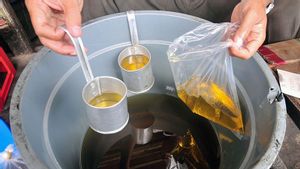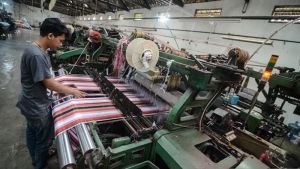JAKARTA - The Ministry of Industry (Kemenperin) believes that the export performance of the manufacturing industry will increase again after the COVID-19 pandemic even though in April 2023 the monthly export growth will reach its lowest point due to the seasonal pattern of Eid al-Fitr holidays and the value of exports affected by the decline in commodity prices.
"Meski demikian, kami meyakini, selanjutnya kinerja ekspor sektor industri Indonesia akan kembali meningkat setelah lepas dari pandemi," kata Juru Bicara Kementerian Perindustrian Febri Hendri Antoni Arif dikutip dari Antara, Rabu, 17 Mei.
The manufacturing industry sector itself is still the highest contributor to exports. Throughout January-April 2023, the manufacturing sector contributed US$60.63 billion or 70.21 percent of the total national exports amounting to 86.35 billion US dollars.
This belief is also supported by indicators of industrial sector performance that show positive growth and expansion.
"Although global economic conditions are still a challenge, both the Indonesian Manufacturing Purchasing Manager's Index (PMI) released by S&P Global and the Industrial Trust Index (IKI) launched by the Ministry of Industry both show expansion level," added Febri.
In April 2023, the non-oil and gas processing sector contributed 67.32 percent of the total national exports in April 2023.
The main market share for exports of the non-oil and gas processing industry includes China (22.90 percent), the United States (11.91 percent), and Japan (5.85 percent).
The Central Statistics Agency (BPS) said that the decline in exports of jewelry and valuables and palm oil was the main cause of the monthly decline in the export value of the non-oil and gas processing industry.
Not only exports, in the same period, total imports also decreased from 20.59 billion US dollars in March 2023 to 15.35 billion US dollars, down 25.45 percent.
The import value of raw/auxiliary materials in April 2023 fell 23.26 percent (m-to-m).
The import value also decreased for all types of imported goods according to use, both raw/auxiliary materials, capital goods, and consumer goods.
The seasonal pattern affects the reduction in raw material and capital goods needs for production activities, explained Febri.
The decline in imports of raw materials can also be caused by global market conditions. This is in line with the decline in export value, especially for export-oriented sub-sectors such as the textile and textile product (TPT) industry, the skin and footwear industry, and the furniture industry.
Meanwhile, in the plastic industry, the decline in imports of raw materials occurred in April 2023 because in the previous month there had been an increase in imports of synthetic resins.
The increase in imports in March indicated an increase in production rates in the plastic goods industry group as a synthetic resin user, coinciding with preparations for Eid al-Fitr 1444 H.
"In that period, producers maximized the production activities of goods from plastic to meet their needs, including for the food and beverage industry," he said.
Febri said, facing the declining condition of imports of raw materials, the Ministry of Industry will continue to strive to encourage increased exports and control of the domestic market.
Regarding the declining condition, if you look at IKI data in April 2023, the percentage of industrial business actors who stated that their business conditions were increasing and stable was 73.9 percent, and there was an increasing trend of optimism for industrial business actors.
The Ministry of Industry, he continued, also continues to strive to implement strategic steps to protect the market for manufactured products in Indonesia. These include the downstream policy, encouraging programs to increase the use of Domestic Products (P3DN), accelerating the Domestic Component Level (TKDN), and simplifying the TKDN certification rules for Small Industries.
VOIR éGALEMENT:
In addition, the government continues to actively make efforts to expand exports through bilateral and multilateral cooperation, as well as open export markets to non-traditional countries.
"Cooperation with partner countries and global investors can make Indonesia enter the global supply chain, increase industrial competitiveness, and open wider overseas markets," said a spokesman for the Ministry of Industry.
The English, Chinese, Japanese, Arabic, and French versions are automatically generated by the AI. So there may still be inaccuracies in translating, please always see Indonesian as our main language. (system supported by DigitalSiber.id)











